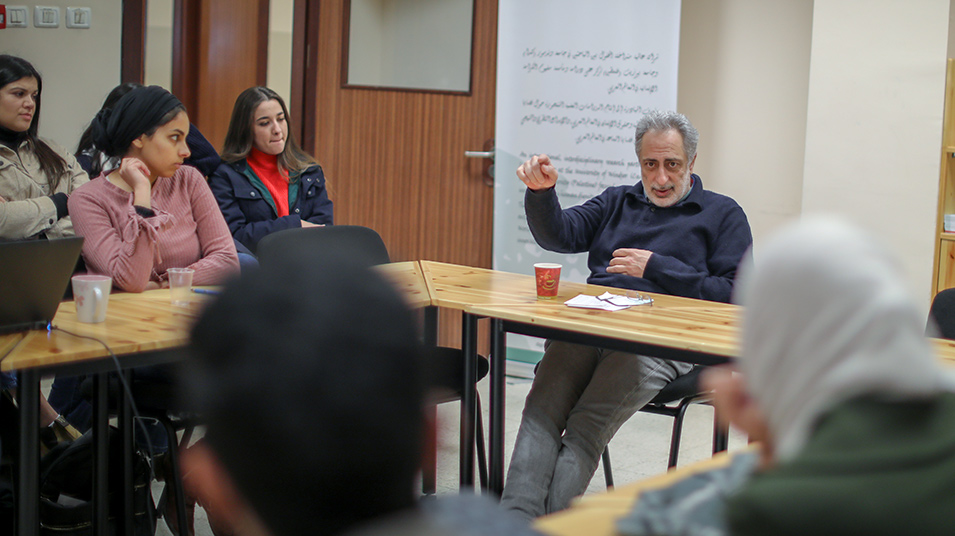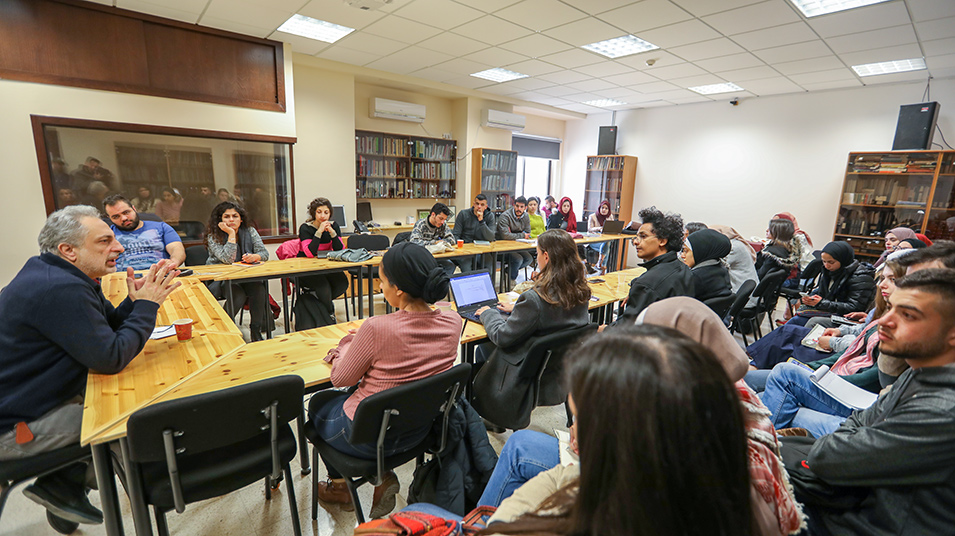Law majors delve into philosophy of law in Idea Factory session
A group of Birzeit University students, most of them law majors, discussed the theory and philosophy of law in a session organized by the Idea Factory, a group of Palestinian youth who aim to strengthen the role of young people in shaping Palestine’s current and future conditions, on Monday, February 18, 2019.
The session opened with a presentation by Mudar Kassis, professor of philosophy and cultural studies at Birzeit University and director of the Muwatin Institute for Democracy and Human Rights. Kassis defined laws as the limitation of freedom accepted by people who wish to protect their property because they fear the lack of order that is thought to coincide with any act that violates the law.
“Modern states control individuals by implementing laws that divide individuals into categories with unequal rights, based on limitations set by the abstract entity of the legislator. The regulation of individuals as a function of the law is, therefore, a form of domination, as the law restricts the freedom of individuals who are in theory equal and free and coerces them into auto-regulating themselves and those around them,” Kassis clarified.
The law is a tool utilized to organize social relations, said Kassis. Because relations are intangible and cannot be directly controlled or manipulated, the law operates by limiting the parties that are involved in these relations. It creates a mode of regulation that operates through coercion and by punishing individuals for disobeying the law.
In modern times, the law has manifested itself in the political structure of the nation state that serves as the abstract object of the law and in the name of which the processes of regulation and control take place. Kassis emphasized that the regulation of people as a function of the law is a domination technique that restricts the freedom of individuals to, ostensibly, protect them and their private property.
Kassis then discussed the purpose of the legal system, explaining that in theory, the system should allow society to realize individual and collective wills. In reality, however, political systems, through various means, limit the freedom of individuals and thus go against their will. This limitation, coupled with other types of power relation that operate at the micro and macro levels of society, ingrain in individuals the normalcy of the political structure’s rule over them. From a socio-natural metabolic perspective, the law and the state are not sustainable systems.
Elaborating on the nature of and assumptions behind laws and regulations and on the techniques they employ, Kassis pointed to the fact that the law presumes conflicting interests between individuals, resembling the Hobbesian “war of all against all.” He then discussed with the attendees the variable distinctive connotations of the “legal person” and the “subject of the law,” with unequal privileges and obligations, and the differences created by differentiating between a natural person and the legal invention of the juridical person. These differentiations, together with the assumed fear for one’s property, lead people to accept the limitation of their freedom and to dread a lack of order; they create the conditions conducive to their acceptance of the coercive legal system in order to protect property and avoid punishment.
The Idea Factory is a student initiative established at Birzeit University in 2014 under the Windsor Birzeit Dignity Initiative. Carried out by a group of students who strive to strengthen the role of youth in shaping Palestine’s future, the initiative is part of Birzeit University’s mission to develop and advance the Palestinian community.








